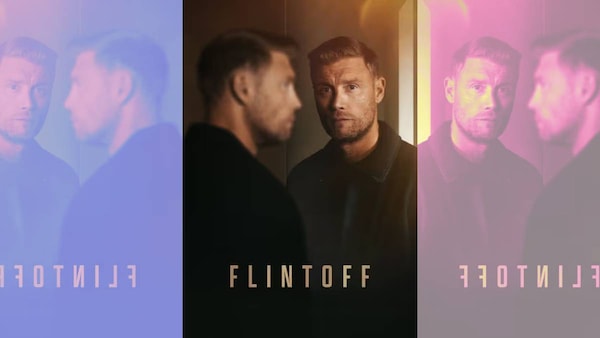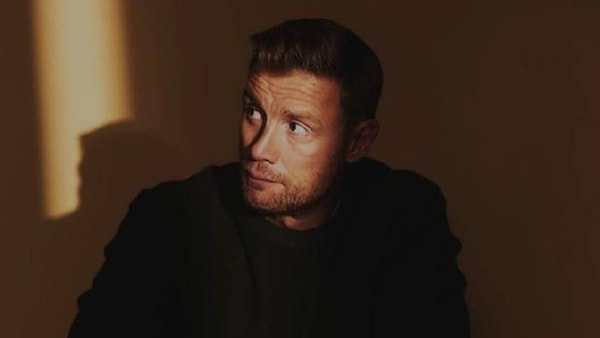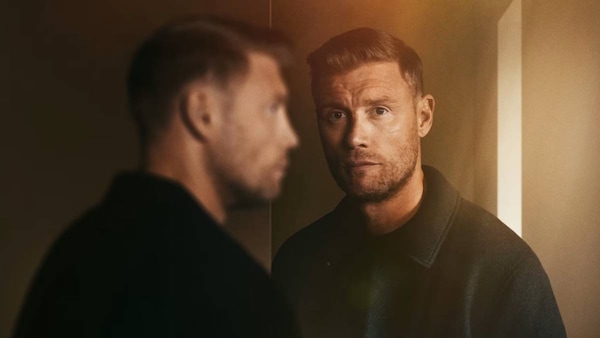Flintoff And The Sport Of Personal Essays
This is 'Viewing Room', a column by OTTplay's critic Rahul Desai, on the intersections of pop culture and life. Here: Notes on the JioHotstar sports documentary Flintoff.

Last Updated: 09.36 PM, Jun 04, 2025
FLINTOFF follows former England cricketer Andrew “Freddie” Flintoff during his recovery from a horrific car accident while filming Top Gear in 2022. It examines the man at his lowest, reclusive and struggling to process the trauma of the crash and a patched-up face. His rehabilitation is interspersed with glimpses of the famous life and career: his rise as a Lancashire prodigy, his era-defining on-field exploits, his boozy adventures, the 2005 Ashes series, his early retirement, and his pivot to television and entertainment. In terms of form and structure, Flintoff brings to mind the psychological excavations of Ben Stokes: Phoenix from the Ashes and Andy Murray: Resurfacing — completing the (unofficial) mental-health trifecta of modern celebrity. All three feature British male superstars who aren’t afraid to bleed on camera; these are confessional accounts of ordinary individuals who’ve been blessed — and cursed — with extraordinary powers.
As an Indian sports enthusiast, it’s always a bit of a culture shock to watch a ‘Western’ sports documentary — or more specifically, a human documentary about a vulnerable athlete. I can imagine a crew filming Rishabh Pant, for example, in the months following his near-fatal car accident. But what I can’t imagine is the documentary being anything but motivational; the man is bound to be concealed within the packaged masculinity of his brand. Physical setbacks are fine, but God forbid they express mental fragility, self-doubt or any emotion that does not fit the binary narrative of a comeback. Personal demons are a no-no, lest we start to relate to these greats and see them as something other than stories.

The only pain allowed is the tangible kind, otherwise there would be in-depth (as opposed to “tell-all”) books or films on ‘troubled’ cricketers like Vinod Kambli and Prithvi Shaw. It’s the reason why the 2006 Pepsi ad showing a modest, shorn-of-airs Sourav Ganguly admitting that he dreams of playing for India again ruffled so many feathers. It was simply not normal to see an out-of-favour ex-captain publicly ask millions of viewers — rhetorically, of course — if they still remember him. He wasn’t supposed to look so small. It was a performative spot, but it was the closest an Indian sports icon had come to airing his insecurities and being unguarded.
Flintoff is a world apart, for most of its scars are the ones that cannot be seen. Most of its nakedness comes from within. That’s saying something, especially for a documentary that recounts the physicality of an accident and its aftermath in explicit detail. (The pre-surgery photos aren’t for the squeamish.) But one of England’s most recognised smiles is distorted — more figuratively than literally — by a toppled car. For someone who thrives on being in the limelight, he hasn’t just lost his face; he’s lost face. He’s retreated into the shadows, away from his long-term marriage with visibility. This documentary then doubles up as therapy for a superhero learning to shed his mask; his skin is no longer his. The camera eases him into the act of being seen again. Flintoff speaks about his past, his friends and family speak about him, and his self-awareness grows with every interview. The more he thinks, the more we realise how the life-changing incident forced him to confront his greatest fear: the fear of being forgotten.
The point of Flintoff, unlike its hypothetical Indian counterparts, is that it doesn’t exist as a message. There is no ulterior motive beyond the experience of a man unbreaking; the privacy is palpable. It’s the kind of introspective personal essay that turns into a meditation on identity and belonging. It’s necessary for nobody but Flintoff himself; a viewership is almost incidental. It never set out to be this documentary, as director John Dower — who inserts himself into the journey with his fourth-wall-breaking questions, thoughts and voice-overs — clarifies towards the end. But Flintoff goes where time takes it. It flows along with the uncertainty of Andrew Flintoff’s condition, taking the shape of life itself: non-linear, observational, unplanned, full of hindsight.

The romance of fate, too, is underlined. It emerges that a young Andrew Flintoff rescued English cricket from the stiffness of history and tradition, only for cricket to then return the favour — and rescue him from a future of anonymity. The very game that broke his body restores his spirit. It’s a love story replete with the giddiness of honeymoon phases, the promise of long-term companionship, the seven-year itch, the inevitability of heartbreak, and the belated dignity of closure. A wonderful moment reveals Flintoff as much as it unveils him — it features him making his first public appearance after ages: in the balcony as an assistant coach of the England team. The tabloids that used to scrutinise his every move hail his courage; the press cameras re-adjust their lens to accommodate a more mortal Freddie. The full circle is hard to resist. Some of the best nonfiction humanises the language of fiction.
MORE FROM 'VIEWING ROOM' | The Great Expectations Of Past Lives
The real triumph of Flintoff, though, is its deconstruction of aura. It lets the viewer identify with a legend who’s spent most of his life being out of reach. It’s not just the erasure of distance between us and Andrew Flintoff. It’s a symbiotic relationship: he sounds like one of us, but even we are allowed to sound like him. And it doesn’t feel like a stretch. For instance, early on, he speaks about how his nickname ‘Freddie’ was a fun alter-ego he created to navigate the social challenges of rising through the domestic ranks. Andrew is the shy Northern introvert, but Freddie is the alcohol-guzzling and attention-loving party animal who alters the uppity DNA of English dressing rooms. It’s almost like booze becomes his superpower. He is judged for it widely, but even his closest people acknowledge that he might not have been half the cricketer if not for his Shane-Warne-coded lifestyle. That’s the thing about flying too close to the sun — it involves flying. The documentary, in essence, becomes about him discovering a middle ground between Andrew and Freddie; between walking and soaring.

I found myself resonating with this particular aspect. An introvert having an alter-ego is not new, but it’s the catalyst that matters. Cricket was Flintoff’s; it was his license to express himself and be anyone he wanted to be. For others, it can be a person. When I moved to Mumbai in 2002, I went into a shell. Change didn’t suit me. Some family problems, a new environment and no familiar faces furthered my isolation. If someone addressed me by my name, Rahul, it took me a few seconds to react; I didn’t really know who I was. During my first year of college, I made my first friend in the city. For some reason, he decided to address me by my initials — “RD” — as an in-joke about Rahul Dravid being my favourite Indian cricketer.
Before I knew it, I became this strange and shapeless RD around him. Like Freddie around English cricket, I subconsciously started to offset his calm temperament by being the less-calm and more talkative one. He was analytical, so I chose to be sentimental. RD liked joking, bunking classes, watching movies, hanging out, being spontaneous, drinking beer and having questionable fashion choices. The moniker caught on. It became my college identity, but the moment I reached home and heard my warring parents, I’d become a meek and mild-mannered Rahul again.
Over the years, only this friend made me feel like RD: cool, unflustered, sensitive. In his company, anything was possible. We complimented each other well. I don’t think he ever called me by my actual name again, even when he spoke about me to others. Maybe my presence bolstered who he was as well. From time to time, he’d mention that he admires me for following my passion and dropping out of the 9-to-5 race. He may not have sensed it, but that was the RD he willed into existence. He never commented on my writing, but I was aware that he’d read every word. We travelled and explored new countries together; it was always “RD and his backpack and his free walking tours”. It was always a fist-bump and a growling “c’mon RD!” while watching a tense game. At some point, I stopped remembering who Rahul was; I didn’t need to, as long as he was in my life.

He died in 2023. As did the alter-ego, RD, that he had so generously bestowed on me those decades ago. It’s been a struggle to remember RD since. It’s been a battle to be anyone at all. I’ve forgotten the last time I truly laughed, or tried to make someone laugh. I’ve also forgotten what it is to be chatty, confident and reciprocative. A few common friends still call me RD, but it’s not the same. The shell is back. It’s a bit like Flintoff shutting down for months after the accident. But cricket came back for him. I don’t know if my best friend can come back. At the most, I sort through our memories and try to locate the man he made me feel like. It’s like wearing remnants of a torn cape and hoping to magically fly. The documentary ‘healed’ someone like Flintoff; it assisted him back into the world that knew him as Freddie. Perhaps these pieces — these personal essays disguised as reviews — are a way of being my own documentary. They’re for me and me alone, and there are no lessons to take away. There is no resolution, no ending.
Towards the end of Flintoff, his comedian friend Jack Whiteall mentions how the biggest sign of Freddie inching towards his old self again is his unresponsiveness to text messages; they knew something was not right with him earlier because he’d reply instantly. Now that he’s better, his tardiness is comforting to them. It’s a sign of recovery. For me, it’s been the opposite. I used to immediately respond to messages and missed calls. Now they lie in my inbox, unanswered for days and weeks on end. Entire relationships and communication threads wither away; issues and cracks are left unaddressed. In a way, my friend is the same. I often click on his name and send him a text message — he hasn’t replied in more than two years. RD would have offset his slowness by being the pushy one. RD would have been mindful and manufactured a new grammar of banter. Maybe it’ll happen some day. Maybe my initials will stop sounding like random alphabets strung together. And maybe a documentary might be my resolution, disguised as a reckoning.
Flintoff is streaming on JioHotstar.
